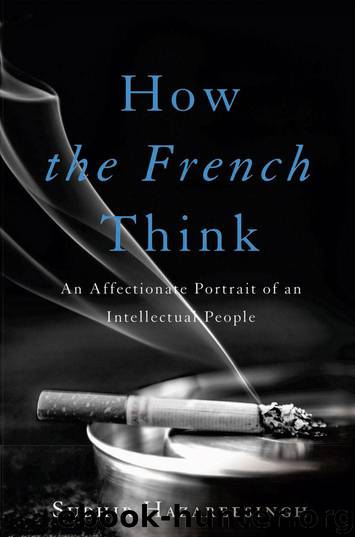How the French Think: An Affectionate Portrait of an Intellectual People by Hazareesingh Sudhir

Author:Hazareesingh, Sudhir [Hazareesingh, Sudhir]
Language: eng
Format: azw3
ISBN: 9780465061662
Publisher: Basic Books
Published: 2015-09-21T16:00:00+00:00
Letters from America
A possibility of salvation for the structuralist project opened up from without. From the late 1960s there was an increasing dissemination of the works of contemporary French thinkers outside their native land. Just as their influence was peaking in France, Foucault’s writings about power, knowledge, and sexuality, and Derrida’s work on deconstruction, found new international audiences.
“French theory” transformed the internal configuration in a range of disciplines in the humanities and social sciences across the Western world, from philosophy to film studies, and helped to generate new fields, such as post-colonialism and ethnic and gender studies. With the proliferation of terms such as “episteme,” “discourse,” “archaeology,” “absence,” and “(phal)logocentricism,” and the support of a fresh wave of theorists—notably, Julia Kristeva, Jean Baudrillard, and Gilles Deleuze—the disembodied ghost of Western reason was subjected to a further round of battering. By the turn of the century, concern with disordered taxonomies, collapsed hierarchies, enunciative modalities, and privatized truths had become so pervasive in the American intellectual sphere that they were lampooned in Andrew Boyd’s Life’s Little Deconstruction Book, which summed up the new age of the fractured self with such delicious maxims as “Scrutinize power,” “Lose the centre,” and “Fashion reason, and reason about fashion.”30
For reasons that will become clear, it was in the United States that this diffusion of French theorizing had its most sustained impact. The most important single characteristic in this transplantation of French philosophy across to the New World was its literary reappropriation: more than half of the articles devoted to Barthes, Lacan, and Foucault in the United States during the 1980s were in the field of literature. Derrida’s work had an even more catalytic effect, contributing to the transformation of many university literature departments (notably, at Yale) into bastions of deconstructionism. This structuralist momentum was fueled by the zeal of Derrida’s American supporters, by the philosopher’s frequent lecturing tours in the United States, and by his appointment in 1986 to a professorship in the Humanities at the University of California, Irvine.31
Derrida added to the mystique with suitably cryptic interventions, as when he claimed in 1985 that deconstruction was synonymous with America—before withdrawing the assertion. A taste of this mystification can be savored in the following rendering of this seminal episode by a Derridian devotee a decade later: “The image discarded—America as a geopolitical enterprise—does not qualify the ‘toponomy’ of America for deconstruction, that is America as deconstruction’s hypothetical ‘residence’ at a specific moment, a moment whose historicality might be most appropriately captured by calling it in deconstruction. Deconstruction may be America to the extent that America is in deconstruction.”32
This migration of French ideas was made possible by the increasing frequency with which structuralist philosophers were invited across the Atlantic from the mid-1960s on as well as by a propitious institutional and editorial context in the United States. As their works were translated into English, these thinkers helped to provide younger academics with the conceptual instruments needed to unsettle the conservative traditions dominating the humanities and social sciences in American universities.
Download
This site does not store any files on its server. We only index and link to content provided by other sites. Please contact the content providers to delete copyright contents if any and email us, we'll remove relevant links or contents immediately.
The Secret History by Donna Tartt(18998)
The Social Justice Warrior Handbook by Lisa De Pasquale(12177)
Thirteen Reasons Why by Jay Asher(8874)
This Is How You Lose Her by Junot Diaz(6857)
Weapons of Math Destruction by Cathy O'Neil(6248)
Zero to One by Peter Thiel(5767)
Beartown by Fredrik Backman(5717)
The Myth of the Strong Leader by Archie Brown(5482)
The Fire Next Time by James Baldwin(5409)
How Democracies Die by Steven Levitsky & Daniel Ziblatt(5200)
Promise Me, Dad by Joe Biden(5130)
Stone's Rules by Roger Stone(5065)
A Higher Loyalty: Truth, Lies, and Leadership by James Comey(4937)
100 Deadly Skills by Clint Emerson(4900)
Rise and Kill First by Ronen Bergman(4761)
Secrecy World by Jake Bernstein(4727)
The David Icke Guide to the Global Conspiracy (and how to end it) by David Icke(4685)
The Farm by Tom Rob Smith(4487)
The Doomsday Machine by Daniel Ellsberg(4474)
